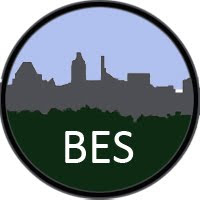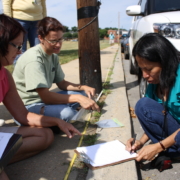Education and Outreach
The Baltimore Ecosystem Study (BES) education program is tasked with infusing BES science into the public sphere. Fostering an understanding of the metropolis as a social-ecological system lies at the core of the BES Education mission. Novel research seeks to understand what supports teachers in mainstream school settings in embracing this mission, and what supports students in developing principle-based reasoning about key facets of their urban landscape.
Selected HIGHLIGHTS
- Pathways to Environmental Science Literacy – The Pathways Project investigated student learning progressions for some of the core ideas in environmental science – water pathways and quality, biodiversity and its functional roles, and carbon cycling processes. The program also provided intensive teacher professional development in pedagogical content knowledge of 8 key teaching practices for environmental science literacy.
- Comp Hydro – Comp Hydro is working with high school Earth, environmental, life and computer science and engineering teachers as part of the push by national leaders to advance the teaching of computer science and computational thinking linked to the teaching of science. The Comp Hydro curriculum in Baltimore addresses the question “Why does Baltimore flood so frequently?” through a series of physical, mathematical and computational models and using real data from local watersheds.
- Integrating Chemistry and Earth science (ICE) – To comply with the Next Generation Science Standards, every high school student in Baltimore City Public Schools will now learn Earth science concepts through a new high school chemistry curriculum. ICE uses engaging Earth-chemistry phenomena in the local environment of Baltimore, BES datasets and protocols to answer the questions: 1) Why is Baltimore so Hot? and 2) What happened to Baltimore’s mountains?
Selected PUBLICATIONS
- Berkowitz, A.R., B. Caplan, S. Blunck, J. Coffey and J.L. Gordon. 2019 (in press). Teaching and Learning the Baltimore Ecosystem. In: Science for the Sustainable City: Empirical Insights from the Baltimore School of Urban Ecology, edited by S.T.A. Pickett, M.L. Cadenasso, J.M. Grove, E.G. Irwin, E.J. Rosi, and C.M. Swan. Yale University Press, New Haven.
- Caplan, B., Gunckel, K.L., Warnock, A., Cano, A. 2012. Investigating water pathways in schoolyards. Green Teaching. V. 98 (Winter): 28-33.
- Berkowitz, A., C.H. Nilon & K.S. Hollweg. 2003). Understanding urban ecosystems. A new frontier for science and education. Springer-Verlag, New York.
- Jin, H., Johnson, M.E., Shin, H.J., Anderson, C.W. 2017. Promoting students’ progressions in science classrooms: A video study. Journal of Research in Science Teaching. Version of Record online: 3 FEB 2017 | DOI: 10.1002/tea.21388
- Gunckel, K. L., Covitt, B. A., Salinas, I., & Anderson, C. W. 2012. A learning progression for water in socio-ecological systems. Journal of Research in Science Teaching 49:843-868.
- Rinke, C., T. Irish and A.R. Berkowitz. Professional Growth Orientation and Collaboration: Mediating Roles in Science Teacher Professional Learning. The Science Educator. In press.
- Covitt, B.A., Gunckel, K.L., Caplan, B., Syswerda, S. 2018. Teachers’ use of learning progression-based formative assessment in water instruction. Applied Measurement in Education, 31:2: 128-142, DOI: 10.1080/08957347.2017.1408627
- Forster, M.; Bestelmeyer, S.; Baez-Rodriguez, N.; Berkowitz, A.; Caplan, B.; Esposito, R.; Grace, E.; McGee, S. 2018. Data Jams: promoting data literacy and science engagement while encouraging creativity. The Science Teacher September 2018: 48-53.
Contacts:
Alan R. Berkowitz, BES Education Team Leader, berkowitza@caryinstitute.org, 845-677-6700 x 311
Bess Caplan, Ecology Education Program Lead, caplanb@caryinstitute.org, 410-455-1863





